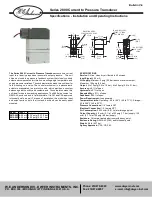
10
65-2649SS-CH4-4 M2A Transmitter Operator’s Manual
Internal Description
This section describes the internal components of the M2A. The internal components of the M2A include the
terminal PCB which provides for all the wiring connections to the M2A and the control PCB which displays the
gas reading and has the control buttons.
Figure 2: M2A Internal Components
Terminal PCB
The terminal PCB is encapsulated in epoxy for protection against moisture and physical damage. It is mounted
into the rear of the junction box with three standoffs and rests on a thin layer of foam. A banana jack is screwed
into each of the standoffs and used for mounting the control PCB. The terminal PCB converts the electrical
output from the detector to a signal which can be displayed by the OLED display, a 4 - 20 mA signal (that is
proportional to the detection range), and an RS-485 Modbus output signal. The 4 - 20 mA signal may be used by
a recording device, gas monitor controller, or programmable controller. The Modbus output may be used to
connect the M2A to a Modbus network. The terminal PCB also controls three relays, one fail and two gas alarm
relays.
Two columns of plug-in style terminal strips are used to make all wiring connections to the M2A. The column on
the left consists of the power/signal, detector, and Modbus terminal strips. The column on the right consists of
the relay terminal strips. A 20 position connector at the bottom of the terminal PCB is used to connect the
terminal PCB to the control PCB with a ribbon cable. A 5 position connector on the left side of the terminal PCB
is used by factory or field service personnel to program the M2A. A factory adjust pot just above the
programming connector is used to set the detector current.
NO
Control PCB
M2A T RANSMITT ER
RKI INSTRUMENT S
M2A Junction Box
Terminal PCB
3/4 NPT Conduit
Opening for Wire Entry
3/4 NPT Conduit Opening, Plugged











































